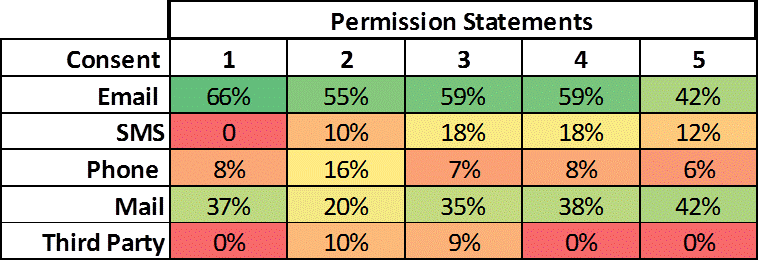Consent is Power!
12 Jul 2017

With the environment changing, consumers know they have choices and this legal pressure is fuelling a move towards more explicit consent. Brands can no longer play “hide the opt-out statement” because consent is not passive. It has implications and decisions are required.
ICO Guidance encourages brands to give consumers choice over the channels through which they receive marketing; and research from the Consent Optimising Benchmarks shows choice of channel dramatically affects consent rates, as does wording, structure and order. Thus, important choices need to be made.
Is third party data crucial, because we know it supresses consent levels across other channels? How important is telephone? What about new media which will grow in importance?
Below are the consent levels achieved by five slightly different permission statements:

Which statement is the best? The decision about which statement is selected will have profound implications on the amount of data generated and on managers’ ability to hit their targets.
If email is most important, then perhaps statement 1 which achieves 66% should be chosen. However, with SMS becoming a growing channel, maybe it should be statement 3 or 4. Phone, while not necessarily popular, is arguably the best at generating immediate revenue and statement 2 is the best for telephone.
Consent for post varies between a miserly 20% to a more acceptable 42%. Selecting statement 5 over statement 2 would more than double the volume of direct mail contact available, but this comes at the price of the complete removal of third party data, halving the amount of telephone data and attracting fewer email consents.
Each of these choices has an effect on an organisation’s revenues, costs and politics. Consent is power. But to retain and grow this power, managers need to convince individual groups of consumers to give their consent.
· Read about the three key pillars that influence consent www.fastmap.com/pillars
· What makes consent an ‘elevator pitch’ – www.fastmap.com/elevator
· How consent can be about quality, not quantity – www.fastmap.com/types
Download the 11 Steps to Your Consent and Permissions whitepaper – normally £50, free for DMA members with download code 11STEPS102 – www.fastmap.com/11steps

By David Cole, Managing Director, fast.MAP
Note: First version of this article was published on 14th July 2015

Please login to comment.
Comments